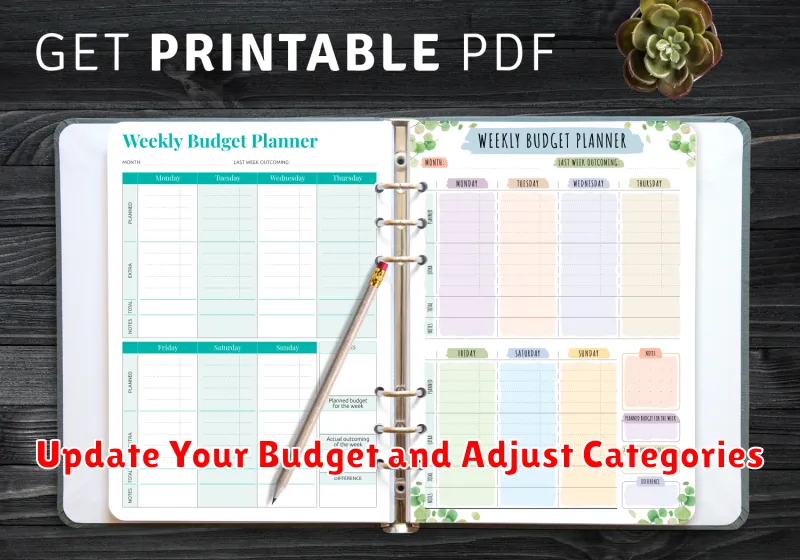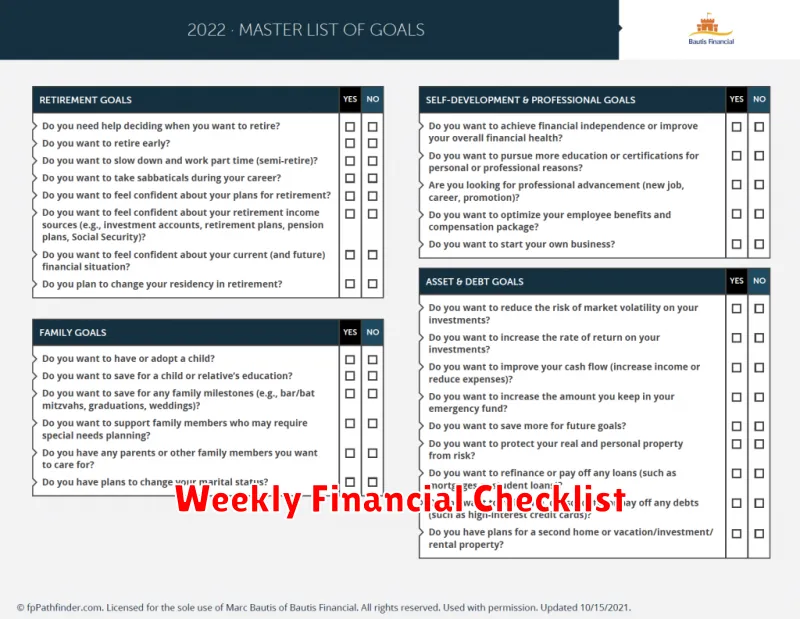In today’s fast-paced world, managing personal finances can often take a backseat to other pressing responsibilities. Establishing a weekly financial routine is not just an organized approach to handling your finances, but it is a revelatory practice that ensures better control over your financial future. This article, “How to Create a Weekly Financial Routine That Works,” delves into practical strategies and provides insights to help you develop a sustainable routine tailored to your unique financial situation. By prioritizing these proactive measures, individuals can navigate through financial uncertainties with increased confidence and clarity, ensuring long-term stability and success. Discover effective tips and empower yourself to take meaningful steps towards achieving your financial goals.
Set a Fixed Time Each Week for Money Check-In
Establishing a weekly financial routine necessitates consistent check-ins to ensure your financial health is on track. By dedicating a fixed time each week to review your finances, you create a disciplined approach toward managing your money. This routine allows you to prioritize your financial goals and make necessary adjustments promptly.
When you set a fixed time for your money check-in, you are more likely to remain committed and avoid procrastinating financial tasks. Choose a day and time when you are least likely to be distracted, ensuring that you can focus entirely on reviewing your expenses, budget, and any financial obligations. This dedicated period helps build a routine that enhances your financial awareness and decision-making skills.
The consistency of checking in every week allows you to identify patterns in your spending habits and track your progress towards financial milestones. This reflection is crucial for recognizing any emerging financial issues early and addresses them before they escalate. Therefore, by dedicating this specific time weekly, you reinforce your accountability and commitment to your financial well-being.
In conclusion, setting a fixed time each week for a money check-in is not merely about maintaining a schedule but is a strategic move towards achieving long-term financial stability. It helps streamline your financial processes while fostering disciplined habits that contribute to smarter financial decisions.
Review All Transactions and Receipts
Establishing a weekly financial routine involves meticulously analyzing all financial activities. Begin by reviewing every transaction and receipt from the past week. This step is crucial in maintaining an accurate record and ensuring that all expenditures align with your budget and financial goals.
First, gather all receipts and bank statements from the week. Categorize these based on types such as groceries, utilities, and leisure. This organization assists in identifying spending patterns and areas that need adjustment.
Next, cross-reference the receipts with your bank and credit card statements. This verification process helps in identifying any discrepancies or unauthorized transactions, thereby safeguarding against potential financial errors or fraud.
Documenting each transaction in a financial log or spreadsheet can provide a clear overview of your financial activities. Regular attention to these details fosters financial discipline and promotes mindful spending habits.
By consistently reviewing all transactions and receipts, you enhance your financial awareness and position yourself to make informed financial decisions, ultimately contributing to a stable and robust financial routine.
Update Your Budget and Adjust Categories

One of the crucial steps in establishing an effective weekly financial routine is to update your budget regularly. Set aside time each week to review your financial activities and ensure your budget reflects your actual spending habits. This ongoing process helps prevent overspending and promotes financial accountability.
Begin by categorizing your expenses using predefined budget categories. These categories may include essentials like housing, groceries, transportation, and entertainment. Ensure that all your expenditures are accurately recorded, allowing you to identify where adjustments may be necessary.
As you review your financial activities, be prepared to adjust categories if needed. Life circumstances and priorities can change, demanding flexibility in your financial management. Adjusting categories effectively helps you align your budget with your current financial goals and life situation.
With consistent updates and adjustments, you will attain a more comprehensive view of your financial situation, making it easier to make informed decisions that support your financial well-being.
Check Upcoming Bills and Due Dates
Establishing a weekly financial routine involves keeping track of all your upcoming bills and due dates. Doing so can help you avoid late payments and maintain a good credit score.
Start by listing all regular bills such as utilities, rent, and loans, alongside their due dates. It’s essential to update this list consistently as it will guide your payment schedule.
Utilize tools like calendars or financial apps to set reminders for these due dates. This proactive approach helps in managing your finances effectively by ensuring all payments are made on time.
Review your list weekly to account for any changes or newly acquired bills, ensuring that nothing slips through the cracks.
Finally, consider setting up auto-pay for recurring bills to streamline the process further, while still monitoring your account for accuracy and any unexpected charges.
Transfer Money to Savings or Investment Accounts
Establishing a weekly financial routine is essential for maintaining financial discipline. One key aspect of this routine is setting aside a specific amount to transfer into your savings or investment accounts. Doing so ensures that you consistently work towards your financial goals, whether they involve building an emergency fund or growing a portfolio to secure your future.
To start, assess your current financial standing and determine a realistic amount that you can allocate each week. It’s advisable to set up automatic transfers whenever possible. This approach minimizes the temptation to spend and helps in cultivating a savings habit. Over time, even small contributions can accumulate significantly, providing a financial safety net or potentially lucrative returns on investments.
Ensure that your budget accommodates these transfers without straining your daily expenses. You may need to cut back on non-essential spending to make room for savings. Regularly review your financial statements to track progress and make any necessary adjustments.
By integrating these transfers into your weekly routine, you not only create consistency but also enhance your financial security and investment potential. This disciplined approach will set the foundation for a healthier financial future.
Reflect on Your Wins and Challenges
As you establish a weekly financial routine, taking time to reflect on both your wins and challenges is crucial. This practice encourages a deeper understanding of your financial landscape, promoting continuous improvement and preventing the repetition of past mistakes.
Start by identifying your successes. Did you manage to stay within your budget? Perhaps you found a way to save more than anticipated. Recognizing these wins helps reinforce positive behaviors and builds confidence in your financial management skills.
Equally important is analyzing the challenges you faced. Did unexpected expenses throw off your plan? Were there areas where you struggled to control spending? By honestly assessing these hurdles, you can develop strategies to manage or avoid them in the future.
Regular reflection not only strengthens your financial discipline but also allows you to adapt your routine to better suit your evolving goals and circumstances. This balance of acknowledgment and adjustment makes your financial routine more resilient and effective in the long term.
Plan for the Week Ahead Financially
Establishing a strong financial routine requires a clear plan for the week ahead. Begin by listing all upcoming expenses and bill payments, ensuring you are aware of what needs immediate attention.
Next, allocate a specific time each week to review your financial status. This practice not only helps in tracking weekly expenditures but also provides an overview of any adjustments required in your budget.
Establish a weekly savings goal. Even a small amount reserved consistently can make a significant impact over time. This encourages disciplined saving behavior.
Consider setting reminders for your financial tasks. Use digital tools or apps to send notifications about upcoming payments and savings milestones.
Finally, reflect on any financial decisions from the previous week. Identify areas of improvement and aim to make better choices moving forward.
This structured approach to planning ensures you maintain financial health while reducing the stress associated with unplanned expenses or missed payments.
Use a Journal or App to Track Progress
Integrating a journal or app into your weekly financial routine can significantly enhance your financial management. It serves as a centralized place where you can document your financial activities, monitor spending habits, and set achievable goals.
By regularly recording your financial transactions, you gain a clearer understanding of where your money goes, allowing you to make more informed decisions. Using an app can be especially beneficial as it often provides automatic categorization of expenses and generates insightful reports.
Furthermore, tracking your progress with a journal adds a personal touch, encouraging reflection and the opportunity to adjust strategies that better align with your financial goals. It’s important to consistently update your records to ensure accuracy and to get the most out of your tracking efforts.
Whether you prefer a digital tool or a traditional journal, ensuring that you track progress routinely will empower you to maintain control over your finances and work steadily towards your financial aspirations.

